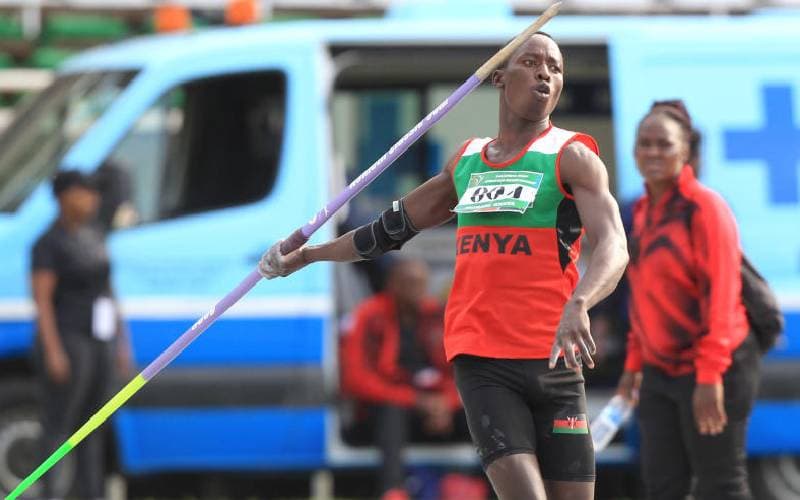We're loading the full news article for you. This includes the article content, images, author information, and related articles.
Fresh from a dominant performance at national trials, Deaflympics bronze medalist Kelvin Kipkogei is aiming for gold in Tokyo, drawing inspiration from Kenyan javelin pioneer Julius Yego.

Fresh off his victory at the Kenyan national trials, javelin thrower Kelvin Kipkogei has firmly set his sights on upgrading his 2022 bronze medal to gold at the 25th Summer Deaflympics, scheduled to be held in Tokyo, Japan, from Wednesday, November 15 to Tuesday, November 26, 2025, EAT. Kipkogei, who secured his spot on Team Kenya following intense trials at Nairobi's Ulinzi Sports Complex, is poised to make a significant impact on the world stage.
His journey is emblematic of a growing ambition within Kenyan athletics to diversify its traditional dominance in track events. Kipkogei's quest is inspired by the groundbreaking success of Julius Yego, the 2015 World Champion and 2016 Olympic silver medalist. Yego, famously nicknamed "Mr. YouTube Man" for learning the sport by watching online videos, shattered perceptions and proved that Kenyans could excel in field events. This legacy has paved the way for a new generation of athletes like Kipkogei to challenge for global honours in disciplines beyond the track.
Kipkogei is no stranger to international competition. He claimed a bronze medal at the 24th Summer Deaflympics in Caxias do Sul, Brazil, in May 2022 with a throw of 51.30m. That achievement, which he described as his first international podium finish, has fueled his determination for the upcoming games. More recently, he demonstrated his versatility and form by winning gold in the long jump at the Africa Deaf Athletics Championships held in Nairobi.
The national trials held in September 2025 at the Ulinzi Sports Complex were the crucible where Kenya's formidable 63-athlete team was forged. The event showcased the depth of talent within the nation's deaf sports community. Following the trials, the national team, including Kipkogei, has been engaged in intensive residential training camps at the Moi International Sports Centre, Kasarani, to fine-tune their preparations. The team has also undergone mandatory anti-doping workshops organised by the Anti-Doping Agency of Kenya (ADAK) in collaboration with the Ministry of Sports, ensuring the team competes clean.
Kenya has established itself as a powerhouse in deaf sports on the continent and a rising force globally. At the 2022 Games in Brazil, Team Kenya topped the African medal table and finished 16th overall, securing a total of 24 medals: five gold, seven silver, and twelve bronze. This was an improvement on their 2017 performance in Samsun, Turkey, where they won 16 medals. The stated ambition for the 177-strong contingent heading to Tokyo is to surpass the medal haul from Brazil.
However, the journey has not been without challenges. Citing budget constraints, officials recently reduced the number of disciplines Kenya will compete in from twelve to five: athletics, swimming, women's basketball, men's handball, and golf. This decision, while difficult, aims to focus resources on teams with the highest potential for medaling, based on international experience and past performance. The Deaf Athletics Association of Kenya (DAAK), which oversees athlete selection and preparation, has historically appealed for greater funding from both government and corporate sectors to support its programs.
The inspiration of Julius Yego cannot be overstated. Before Yego's historic 2015 World Championship gold in Beijing, Kenya had never won a global title in a field event. His success created a paradigm shift, encouraging both athletes and federations to look beyond the track. Yego himself has been a vocal advocate for diversifying Kenya's athletic focus, warning that relying solely on distance running is no longer sufficient to compete with global superpowers like the USA.
Kelvin Kipkogei's pursuit of javelin glory is a direct continuation of this legacy. His training regimen, which includes working alongside hearing athletes at his base in Kapsabet, demonstrates a commitment to reaching the highest standards. As he prepares for the Deaflympics, which will mark its 100th anniversary in Tokyo, Kipkogei carries not only his own ambitions but also the hopes of a nation eager to see its flag raised in a new arena of sporting excellence. His performance will be a testament to his dedication and the enduring impact of a Kenyan hero who dared to throw far.
Keep the conversation in one place—threads here stay linked to the story and in the forums.
Sign in to start a discussion
Start a conversation about this story and keep it linked here.
Other hot threads
E-sports and Gaming Community in Kenya
Active 9 months ago
The Role of Technology in Modern Agriculture (AgriTech)
Active 9 months ago
Popular Recreational Activities Across Counties
Active 9 months ago
Investing in Youth Sports Development Programs
Active 9 months ago